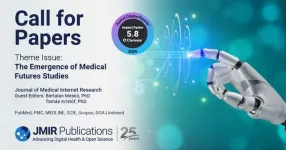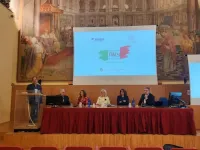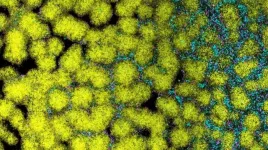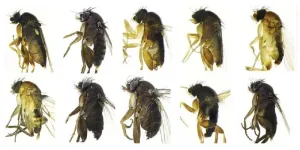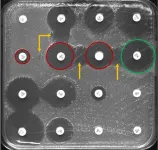(Press-News.org) The first randomized, placebo-controlled clinical trial evaluating the impact of therapeutic monoclonal antibodies on the risk of developing long COVID was led by researchers at Weill Cornell Medicine. The study, published Sept. 1 in eClinicalMedicine, details an international, multicenter phase 2/3 clinical trial that found a combination of amubarvimab and romlusevimab did not reduce the occurrence of long COVID symptoms.
Lasting weeks or even months after SARS-CoV-2 infection, long COVID is characterized by a variety of symptoms that affect each person differently. These include extreme fatigue, difficulty concentrating, muscle weakness, joint pain and memory problems. According to a National Academies report, approximately 15 to 20 million Americans and more than 60 million globally had long COVID at some point.
The study, led by Dr. Teresa Evering, assistant professor of medicine in the division of infectious diseases at Weill Cornell Medicine and an infectious disease physician at NewYork-Presbyterian/Weill Cornell Medical Center, evaluated how antibody treatment, given during acute infection, impacted after-recovery outcomes at nine months.
The research team analyzed data collected as part of ACTIV-2, a clinical trial designed to evaluate the safety and efficacy of investigational therapeutics for treating nonhospitalized adults with mild-to-moderate COVID-19. Conducted in 2021, this trial included more than 800 people at high-risk of severe COVID-19 in the United States and five other countries. The study population was mostly unvaccinated against COVID-19 and enrolled before omicron variants of the SARS-CoV-2 virus emerged.
Previously, Dr. Evering and colleagues showed that those treated in the trial with the antibodies amubarvimab and romlusevimab during acute infection were 79 percent less likely to be hospitalized or die of COVID within four weeks than those who had received a placebo.
For this new study, the researchers assessed the “symptom diary” that trial participants kept for nine months after treatment, in which they recorded the severity of an array of 27 symptoms typical of long COVID. Participants also completed two health-related quality of life questionnaires. The antibody combo continued to provide protection against hospitalization and death through this period. The researchers, however, saw no significant difference in the self-reported symptoms of long COVID for those who received treatment versus a placebo.
“Future research should focus on identifying the mechanisms underlying long COVID, especially in relation to how different therapeutic agents for acute COVID-19 may influence longer term outcomes,” Dr. Evering said. "Additional large-scale randomized, placebo-controlled studies are needed to assess the efficacy of early interventions in reducing long COVID prevalence.”
This study was funded by the National Institute of Allergy and Infectious Diseases of the National Institutes of Health.
END
Search continues for a treatment that reduces long COVID symptoms
2024-10-17
ELSE PRESS RELEASES FROM THIS DATE:
The Journal of Medical Internet Research theme issue call for papers: The emergence of medical futures studies
2024-10-17
(Toronto, October 17, 2024) JMIR Publications invites submissions to a new theme issue titled “The Emergence of Medical Futures Studies” in the Journal of Medical Internet Research, the leading peer-reviewed journal for digital medicine and health and health care in the Internet age, indexed in PubMed, PMC, MEDLINE, SCIE, Scopus and DOAJ.
The rapid progress of technology in health care, combined with significant cultural shifts toward digital health and the urgent need for preparedness, highlighted by events such as the COVID-19 pandemic and climate change, have brought about an increased emphasis ...
License to chill: Bond shows ‘regressive nostalgia’ can freeze a brand's future
2024-10-17
Super-spy James Bond is a prime example of ‘regressive nostalgia’ highlighting how certain consumer groups cling to idealised past versions of brands and resist attempts to move with the times, a new study reveals.
Researchers examined the James Bond movie franchise - a cultural icon for over 70 years - and discovered that some ‘super-consumers’ react negatively to modern portrayals of the fictional British secret agent that reflect contemporary societal values.
Whilst loyal to the brand, these consumers prefer traditional, more exclusionary, versions of Bond which most closely follow author Ian Fleming’s original 1950s and 1960s vision – ...
Researchers from Brazil and Italy search industrial waste for new Alzheimer’s drugs
2024-10-17
A self-proclaimed Brazil-Italy collaboration enthusiast, researcher Laura Bolognesi created the B2AlzD2 Joint Lab at the Department of Pharmacy and Biotechnology of the Università di Bologna (UNIBO), the first Brazil-Bologna joint laboratory dedicated to the development of new drugs for the treatment of Alzheimer’s disease. The partners include scientists from four Brazilian universities: the Federal University of Rio de Janeiro (UFRJ), the University of Brasília (UnB), the University of São Paulo (USP Ribeirão Preto) and the Federal University of Minas Gerais (UFMG).
One of the laboratory’s ongoing ...
BU, Boston Medical Center researchers join forces with GSK to fight lung diseases
2024-10-17
(Boston)—Researchers from the Center for Regenerative Medicine (CReM) at Boston University and Boston Medical Center (BMC) have announced a new collaboration with the global biopharma company GSK to advance innovative research focused on developing cutting-edge models to study and treat lung diseases like pulmonary fibrosis.
Pulmonary fibrosis, including its most common form, idiopathic pulmonary fibrosis (IPF), is a progressive and life-threatening condition that results in scarring of the lungs, making it increasingly difficult for patients to breathe. ...
Bacteria thrive by playing nice before going their own way
2024-10-17
Biofilms — slimy communities of bacteria — grow on all sorts of surfaces: from glaciers and hot springs to plant roots, your bathtub and fridge, wounds, and medical devices such as catheters. Most biofilms are composed of multiple bacterial species, but how these species manage to live together is unclear.
A new study by Dartmouth scientists in Current Biology uses experiments and modeling to delve into how three species of biofilm bacteria coexist — and when they move out on their own. One species, Pseudomonas aeruginosa, a verstaile pathogen known to be antibiotic resistant, dominated ...
Identifying the genes that viruses ‘steal’ from ocean microbes
2024-10-17
COLUMBUS, Ohio – The microbes that cycle nutrients in the ocean don’t do the work on their own – the viruses that infect them also influence the process. It’s a vital job for the rest of the planet, enabling oceans to absorb half of the human-generated carbon in the atmosphere and produce half of the oxygen we breathe.
A new study gets scientists closer to more fully understanding where viruses fit into the global ocean picture of cycling nutrients such as nitrogen, phosphorous and, of particular interest, carbon. The research broadly expands on a 20-year-old finding that genes can be exchanged between viruses and the photosynthetic ...
CDC/PEPFAR awards Georgetown $27.5 million to address HIV/AIDS in Haiti
2024-10-17
WASHINGTON (Oct. 17, 2024) -- The U.S. Centers for Disease Control and Prevention (CDC) and the President’s Emergency Plan for AIDS Relief (PEPFAR), have awarded $27.5 million to the Center for Global Health Practice and Impact (CGHPI) at Georgetown University Medical Center to expand its ongoing work in Haiti to address HIV/AIDS.
For the 150,000 people in Haiti living with HIV, losing access to basic life-saving therapy can lead to unnecessary suffering, risk of transmission to others, and ...
Found hundreds of species using DNA barcoding
2024-10-17
The Earth is an almost unimaginably diverse planet in terms of species. Researchers have identified between two and three million species, but there are many more that we know nothing about.
The unknown species are called ‘biological dark matter’, borrowing a term from astrophysics.
“We want to demonstrate how we can gain a better overview of biological dark matter by using DNA barcoding,” said Associate Professor Emily Hartop.
DNA barcoding, in this case so-called ‘megabarcoding’, might sound mysterious, but it isn’t really. We will come back to that later. First, let us take a look at why ...
Unpaid caregiving is undervalued by society
2024-10-17
WASHINGTON — Americans believe volunteering to help strangers contributes more to society than providing care for family or friends, even though they contribute billions of dollars’ worth of labor in unpaid caregiving every year, according to research published by the American Psychological Association.
This perception could lead Americans of lower socioeconomic status to feel like they have less to contribute than people of higher socioeconomic status, because they often do not have the same amount of time or resources to devote to people outside of their communities.
“Over ...
AI helps to detect antibiotic resistance
2024-10-17
Researchers at the University of Zurich (UZH) have used artificial intelligence (AI) to help identify antibiotic-resistant bacteria. The team led by Adrian Egli, UZH professor at the Institute of Medical Microbiology, is the first to investigate how GPT-4, a powerful AI model developed by OpenAI, can be used to analyze antibiotic resistance.
The researchers used AI to interpret a common laboratory test known as the Kirby-Bauer disk diffusion test, which helps doctors to determine which antibiotics can or can’t fight a particular bacterial infection. Based on GPT-4, the scientists created the “EUCAST-GPT-expert”, which follows strict EUCAST ...
